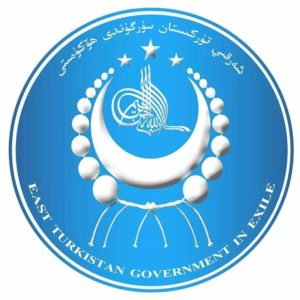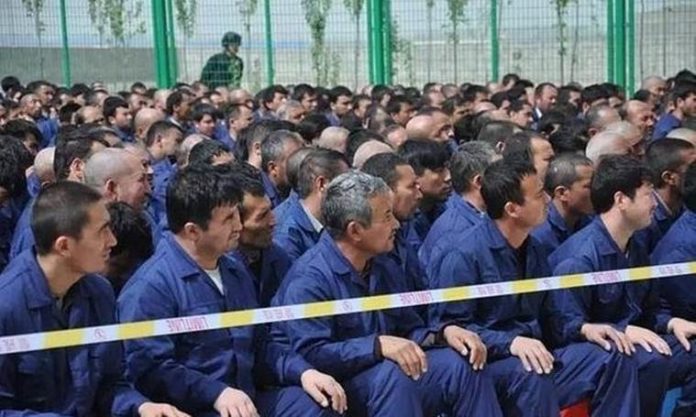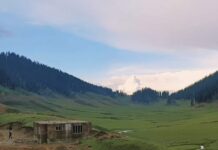(Column by Ghulam Osman, President of East Turkistan Government-in-Exile)

It has never been a crime for Chinese to kill Uyghurs in East Turkistan. This could be the same in other colonized countries. In those countries, murder could arise from a hierarchical difference—one being a master and the other being a slave, and, partially, it could happen among individuals. However, the reason for murder in East Turkestan is totally different—the total annihilation of the Uyghur population of East Turkistan was planned and is unfortunately continuing successfully. This originated from the following goal— “We want land, not its people”—along with hierarchical differences.
This fact is demonstrated in historical correspondence between the Chinese army on a mission to subjugate East Turkestan and direct orders given from their central military headquarters. Orders sent by military headquarters to the army on the frontier enforced this very goal vigorously and at all costs. This concept came from Chinese ancestors and passed on from generation to generation as foundations of Chinese racism and national policy, irrespective of changes in governments and ideologies. Even in during different eras, governments, and ideologies, this concept has remained intact.

The unchanged policy of “we want land, not its people” has been planted into the minds of the Chinese people. So, even if the Chinese keep killing innocent Uyghurs, they will never be considered murderers. The Chinese even passionately indulged themselves in a race of hunting Uyghurs in the streets and bazaars for marksmanship and for fun. Uyghurs would get their hat blown off with a bullet or would be shot dead right on the street. The Chinese hunters, without any consideration of their victim, were busy turning to the next target with great ease and comfort to maximize their “enjoyment” of the killing game.
This happened during the Kuomintang (KMT) era. However, the killing game has continuously happened under the CCP’s rule. It must be stated, the CCP’s propaganda, was more beautiful and positive, giving people a sense of safety but its implementation was totally different. That is, Uyghurs were deprived of rights that humans were never deprived of even in the most primitive societies. During the CCP era, we bore witness to a variety of cases before our eyes in our neighborhoods, towns, and cities, where a Uyghur was murdered by a Chinese, but the murder was justified by the court and the murderer was not punished. If a Uyghur killed another Uyghur, even unintentionally, this was considered a first-degree murder case and the perpetrator was put on death row immediately.
Two specific examples below are enough to highlight the hypocrisy of the CCP when it comes to murder cases. The first example took place on Karakoram-Tibet Highway in Kargilik Town in East Turkestan in 1980. One of the Chinese PLA soldiers, who worked for the vehicle fleet shuttling to and from Tibet and East Turkistan, killed a Uyghur. This soldier hunted a yak of a state-owned animal farm, grazing nearby on a mountain, and loaded the dead yak onto his truck. Strictly speaking, this hunting act itself could have constituted a crime as an act of stealing or doing damage to state property. A Uyghur road worker saw this event, and with an intention of protecting state property, rushed onto the running board of the truck, holding tightly to the steering wheel, without allowing the truck driver to drive continuously, demanding he leave the dead yak on the farm as he did damage to state property, at least. This naïve Uyghur worker was indoctrinated with the communist ideology and acted as a defender of state property, for which he must be praised. Against his intentions, this Chinese communist soldier, who was regarded as a PLA soldier who would not take anything from the people, was indifferent to his demand. Instead, he pushed on the chest of this Uyghur worker away from the running board, but the Uyghur worker refused to get off.
Without being successful, the Chinese soldier then aimed his AK-47 at the Uyghur worker’s throat, threatening him to back off. This “naive” Uyghur was taught to firmly believe in a political myth that the PLA would not shoot the people. At this critical moment, the Chinese soldier pressed the trigger and unloaded the 29 bullets that remained after shooting the yak. All the rocks and sand around the area was covered in the Uyghur worker’s blood and pieces of his head. Then, instead of showing any PTSD like a normal person would have shown after committing murder, the Chinese soldier pushed away the headless body and drove off calmly like nothing happened. It is highly likely that the soldier had never experienced murder. If so, how could not he suffer any PTSD in front of this horrific crime scene? Because he did not think of the Uyghur worker as a human being because he had been indoctrinated to think of Uyghurs are less than human by the chauvinistic Chinese education system.
When the soldier was summoned to attend a military court in the Southern Military Headquarters in Yengishahar County, Kashgar, a group of armed people broke into the court and successfully rescued him unharmed
Afterwards, Chinese migrants in Yengishahar Township took to the streets to protest that the Chinese soldier should not be punished. These protesters mobilized all resources necessary, including a telegraph machine stationed on a truck, to help any Chinese protester who wants to send a plea for pardon for the murderer to the central government in Beijing free of charge. One of the chants they were shouting was quite disturbing: “Since our ultimate goal is to keep the land, not its people, what’s wrong with taking one of their lives sooner?” Furthermore, despite the history of the CCP forcefully stopping protests, considering all protests to be anti-governmental in nature, this protest was neither stopped nor restricted until the protesters themselves stopped.
Eventually, this case was concluded with a report in a Chinese newspaper, Xinjiang Gazette, titled “The mother of the deceased pleaded: ‘Do not punish the murderer, I would like to adopt him in the place of my son.’” As a result, the soldier was found not guilty.
The second example is an incident in Barin village where one of the biggest resistance movements of Uyghurs against Chinese rule took place in 1990. This incident is also about how this resistance was suppressed. On 30 October 2002, Radio Free Asia interviewed a former Chinese military officer who applied for asylum in the US with his lawyer. He stated during the interview that “a village with a population of 10,000 was surrounded by 25000 Chinese military forces supported by tanks and helicopters. Prior to launching an attack on the village, the military commander delivered a short speech to the soldiers in a way that it pertains perfectly to the historical mindset of Han Chinese: ‘The village before us is full of enemies. You do not need to hesitate if there is a good person among them. They are all enemies. You are not accountable for the bullets that you are going to shoot and the lives that you are going to kill. We have given you the bullets to shoot. So, shoot as much as you can and leave no one alive’”
The village houses left over from the middle ages under Chinese rule that was cited as “heaven of socialism” could not withstand the forceful penetration of countless bullets barbarically shot, broken down, burnt or full of holes like the hives of honeybees. Tree branches fell and tree trunks sustained black bullet holes. This point was later confirmed by the medical staff who went to the village that the density of bullet holes on walls and trees was abnormal and beyond belief.
According to the soldier interviewed by the Radio Free Asia (RFA), after heavy fire from outside, Chinese soldiers kicked down doors of each house as if they were attacking an enemy barricade while vehemently shooting bullets and then checked if anybody was left alive. When he entered a house, a toddler came towards him, terrified by the death of his parents, grabbing his foot as a savior. Upon leaving the house after having separated the child from his foot, he run across his boss. His boss scolded him vehemently for not killing the child: “Do you remember the order? Where is your concept of enemy and proletariat consciousness?” He pulled out his gun and shot the toddler dead.
This soldier expressed his feeling to RFA as follows: “Before in our consciousness, only imperialists, revisionists and enemies of people could be that cruel; we saw the indiscriminate, inhumane killings of men, women, children and even animals only in the movies depicting the Sino-Japanese war. We thought this to be only in the nature of Japanese invaders. Today it is mind-blowing to link those cruelties in those movies with the PLA.” The cruelties in the movies were fiction but this massacre was real. The movies were dramatized by the communists, but the Barin village massacre was real.
In the years since, all the policies made by the CCP regarding the Uyghurs has proven that they do not consider Uyghurs as humans. Even Uyghurs who have betrayed their fellow Uyghurs to suck up to the Chinese are no exceptions to this rule. For example, when the Yarkant Elishku massacre took place, two Uyghur traitors who were working for the Chinese tried to escape the village when the soldiers were spraying thousands of bullets their way. However, despite trying to plead with the soldiers and showing them their IDs, the two Uyghur traitors were still not spared.
This is one of the many Chinese national policies that has never changed throughout history.






